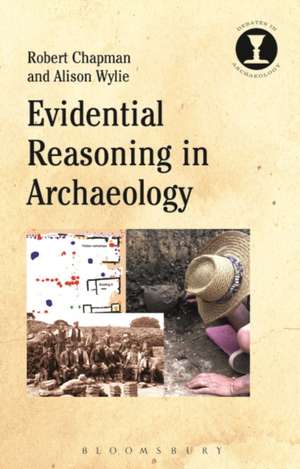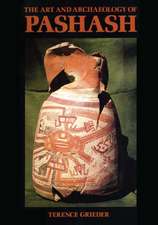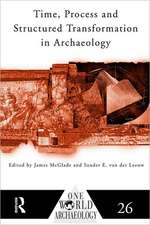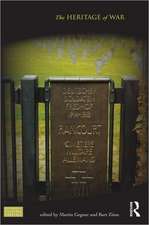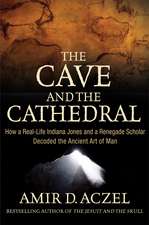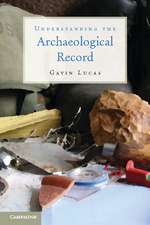Evidential Reasoning in Archaeology: Debates in Archaeology
Autor Professor Robert Chapman, Alison Wylieen Limba Engleză Hardback – 5 oct 2016
| Toate formatele și edițiile | Preț | Express |
|---|---|---|
| Paperback (1) | 230.15 lei 6-8 săpt. | |
| Bloomsbury Publishing – 18 apr 2018 | 230.15 lei 6-8 săpt. | |
| Hardback (1) | 537.55 lei 6-8 săpt. | |
| Bloomsbury Publishing – 5 oct 2016 | 537.55 lei 6-8 săpt. |
Din seria Debates in Archaeology
- 24%
 Preț: 170.07 lei
Preț: 170.07 lei - 24%
 Preț: 170.50 lei
Preț: 170.50 lei - 28%
 Preț: 466.81 lei
Preț: 466.81 lei - 14%
 Preț: 164.50 lei
Preț: 164.50 lei - 17%
 Preț: 171.76 lei
Preț: 171.76 lei - 17%
 Preț: 169.62 lei
Preț: 169.62 lei - 13%
 Preț: 248.61 lei
Preț: 248.61 lei - 18%
 Preț: 169.08 lei
Preț: 169.08 lei - 14%
 Preț: 163.42 lei
Preț: 163.42 lei - 30%
 Preț: 566.67 lei
Preț: 566.67 lei - 22%
 Preț: 594.35 lei
Preț: 594.35 lei - 24%
 Preț: 169.27 lei
Preț: 169.27 lei - 14%
 Preț: 169.27 lei
Preț: 169.27 lei - 24%
 Preț: 169.62 lei
Preț: 169.62 lei - 14%
 Preț: 170.69 lei
Preț: 170.69 lei - 13%
 Preț: 247.98 lei
Preț: 247.98 lei - 24%
 Preț: 168.74 lei
Preț: 168.74 lei - 24%
 Preț: 169.62 lei
Preț: 169.62 lei - 14%
 Preț: 169.79 lei
Preț: 169.79 lei - 14%
 Preț: 247.22 lei
Preț: 247.22 lei - 18%
 Preț: 253.64 lei
Preț: 253.64 lei - 18%
 Preț: 169.44 lei
Preț: 169.44 lei - 14%
 Preț: 178.22 lei
Preț: 178.22 lei - 13%
 Preț: 247.98 lei
Preț: 247.98 lei - 17%
 Preț: 170.32 lei
Preț: 170.32 lei - 17%
 Preț: 170.07 lei
Preț: 170.07 lei - 17%
 Preț: 169.71 lei
Preț: 169.71 lei - 13%
 Preț: 149.87 lei
Preț: 149.87 lei - 14%
 Preț: 162.79 lei
Preț: 162.79 lei - 24%
 Preț: 169.71 lei
Preț: 169.71 lei - 14%
 Preț: 169.88 lei
Preț: 169.88 lei - 24%
 Preț: 170.07 lei
Preț: 170.07 lei - 24%
 Preț: 170.07 lei
Preț: 170.07 lei -
 Preț: 169.62 lei
Preț: 169.62 lei - 14%
 Preț: 169.62 lei
Preț: 169.62 lei - 14%
 Preț: 169.88 lei
Preț: 169.88 lei - 13%
 Preț: 149.87 lei
Preț: 149.87 lei - 30%
 Preț: 567.99 lei
Preț: 567.99 lei - 14%
 Preț: 170.32 lei
Preț: 170.32 lei - 23%
 Preț: 248.17 lei
Preț: 248.17 lei - 17%
 Preț: 169.71 lei
Preț: 169.71 lei - 18%
 Preț: 169.27 lei
Preț: 169.27 lei - 13%
 Preț: 247.70 lei
Preț: 247.70 lei
Preț: 537.55 lei
Preț vechi: 772.35 lei
-30% Nou
Puncte Express: 806
Preț estimativ în valută:
102.86€ • 107.39$ • 85.13£
102.86€ • 107.39$ • 85.13£
Carte tipărită la comandă
Livrare economică 05-19 aprilie
Preluare comenzi: 021 569.72.76
Specificații
ISBN-13: 9781472525277
ISBN-10: 1472525272
Pagini: 264
Ilustrații: 30 bw illus
Dimensiuni: 138 x 216 x 19 mm
Greutate: 0.39 kg
Editura: Bloomsbury Publishing
Colecția Bloomsbury Academic
Seria Debates in Archaeology
Locul publicării:London, United Kingdom
ISBN-10: 1472525272
Pagini: 264
Ilustrații: 30 bw illus
Dimensiuni: 138 x 216 x 19 mm
Greutate: 0.39 kg
Editura: Bloomsbury Publishing
Colecția Bloomsbury Academic
Seria Debates in Archaeology
Locul publicării:London, United Kingdom
Caracteristici
An incisive and original look at the status of archaeological evidence that takes a distinctive bottom-up approach to philosophical and methodological questions about best practices in evidential reasoning
Notă biografică
Robert Chapman is Emeritus Professor of Archaeology at the University of Reading, UK.Alison Wylie is Professor of Philosophy at the University of Washington, USA, and at Durham University, UK.
Cuprins
List of IllustrationsAcknowledgementsIntroduction: The Paradox of Material Evidence1. Archaeological Evidence in Question: Working between the Horns of a Dilemma2. Archaeology Fieldwork: Scaffolding in Practice 3. Working with Old Evidence4. External Resources: Archaeology as a Trading ZoneConclusions: Reflexivity Made ConcreteBibliographyIndex
Recenzii
The book is a concise and insightful piece of work ... [It] offers good guidance for the design and conduct of high-quality evidential reasoning in archaeology.
In the emerging 'engaged philosophy of science' literature, Robert Chapman and Alison Wylie's book sets new standards in its rigor, clarity of argument, and grounding in empirical research. The book is a must-read for everyone interested in scientific reasoning, philosophy of science, especially of social science, and archaeological practice.
In an important volume, Chapman and Wylie offer a perceptive and reflective critique of theory and method in archaeology focusing on how material evidence is constructed and used in archaeology (missing in much of the theory wars of the previous scholarly generation). Like their intellectual hero, David Clarke, they argue that archaeology is a distinct discipline and (retrospectively) thus foreground the current material turn.
In the emerging 'engaged philosophy of science' literature, Robert Chapman and Alison Wylie's book sets new standards in its rigor, clarity of argument, and grounding in empirical research. The book is a must-read for everyone interested in scientific reasoning, philosophy of science, especially of social science, and archaeological practice.
In an important volume, Chapman and Wylie offer a perceptive and reflective critique of theory and method in archaeology focusing on how material evidence is constructed and used in archaeology (missing in much of the theory wars of the previous scholarly generation). Like their intellectual hero, David Clarke, they argue that archaeology is a distinct discipline and (retrospectively) thus foreground the current material turn.
